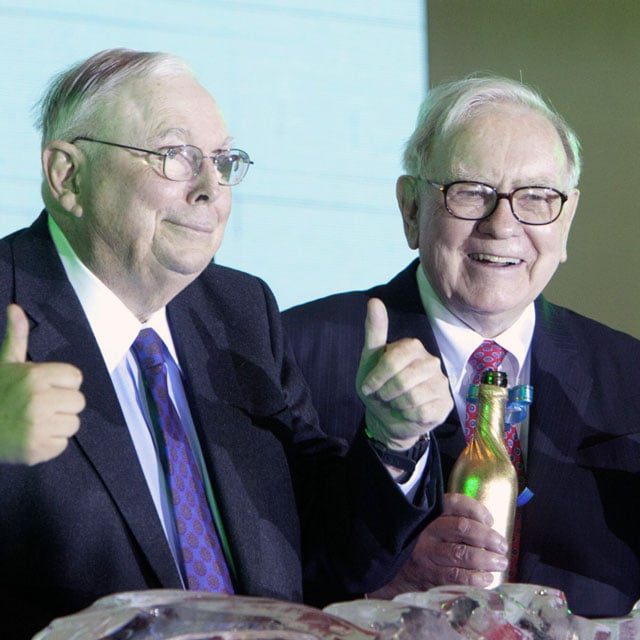Charlie Munger, Who Helped Buffett Build Berkshire, Dies at 99

He used the term “groupies” to refer to his fans, often numbering in the hundreds, who gathered to see him without Buffett. Hosting the annual meetings of Wesco Financial Corp., a Berkshire unit, in Pasadena, California, Munger expounded on his philosophy of life and investing.
At the 2011 meeting, the last before Berkshire took complete control of Wesco, Munger told his audience, “You all need a new cult hero.”
Charles Thomas Munger was born on Jan. 1, 1924, in Omaha, the first of three children of Alfred Munger and the former Florence Russell, who was known as Toody. His father, the son of a federal judge, had earned a law degree at Harvard University before returning to Omaha, where his clients included the Omaha World-Herald newspaper.
Munger’s initial brush with the Buffett family came through his work on Saturdays at Buffett & Son, the Omaha grocery store run by Ernest Buffett, Warren’s grandfather. But the two future partners wouldn’t meet until years later.
Munger entered the University of Michigan at age 17 with plans to study math, mostly because it came so easily. “When I was young I could get an A in any mathematics course without doing any work at all,” he said in a 2017 conversation at Michigan’s Ross Business School.
Nome to Harvard
In 1942, during his sophomore year, he enlisted in the Army Air Corps, soon to become the Air Force. He was sent to the California Institute of Technology to learn meteorology before being posted to Nome, Alaska. It was during this period, in 1945, that he married his first wife, Nancy Huggins.
Lacking an undergraduate degree, Munger applied to Harvard Law School before his Army discharge in 1946. He was admitted only after a family friend and former dean of the school intervened, according to Janet Lowe’s 2000 book, “Damn Right! Behind the Scenes with Berkshire Hathaway Billionaire Charlie Munger.” Munger worked on the Harvard Law Review and in 1948 was one of 12 in the class of 335 to graduate magna cum laude.
With his wife and their son, Teddy, Munger moved to California to join a Los Angeles law firm. They added two daughters to their family before divorcing in 1953. In 1956, Munger married Nancy Barry Borthwick, a mother of two, and over time they expanded their blended family by having four more children. (Teddy, Munger’s first-born, had died of leukemia in 1955.)
Not satisfied with the income potential of his legal career, Munger began working on construction projects and real estate deals. He founded a new law office, Munger, Tolles & Hills, and, in 1962, started an investment partnership, Wheeler, Munger & Co., modeled on the ones Buffett had set up with his earliest investors in Omaha.
“Like Warren, I had a considerable passion to get rich,” Munger told Roger Lowenstein for Buffett: The Making of an American Capitalist, published in 1995. “Not because I wanted Ferraris — I wanted independence. I desperately wanted it. I thought it was undignified to have to send invoices to other people.”
1959 Introduction
His fateful introduction to Buffett had come during a 1959 visit home to Omaha. Though the precise venue of their first meeting was the subject of lore, it was clear they hit it off right away. In short order, they were talking on the telephone almost daily and investing in the same companies and securities.
Their investments in Berkshire Hathaway began in 1962, when the company made men’s suit linings at textile mills in Massachusetts. Buffett took a controlling stake in 1965. Though the mills closed, Berkshire stuck around as the corporate vehicle for Buffett’s growing conglomerate of companies.
A crucial joint discovery was a company called Blue Chip Stamps, which ran popular redemption games offered by grocers and other retailers. Because stores paid for the stamps up front, and prizes were redeemed much later, Blue Chip at any given time was sitting on a stack of money, much like a bank does.
Using that pool of capital, Buffett and Munger bought controlling shares in See’s Candies, the Buffalo Evening News and Wesco Financial, the company Munger would lead.
In 1975, the US Securities and Exchange Commission alleged that Blue Chip Stamps had manipulated the price of Wesco because Buffett and Munger had persuaded its management to drop a merger plan. Blue Chip resolved the dispute by agreeing to pay former investors in Wesco a total of about $115,000, with no admission of guilt.
The ordeal underscored the risks in Buffett and Munger having such complicated and overlapping financial interests. A years-long effort to simplify matters culminated in 1983 with Blue Chip Stamps merging into Berkshire. Munger, whose Berkshire stake rose to 2%, became Buffett’s vice chairman.
China Bull
In recent years, Munger’s fans continued to travel to Los Angeles to ask him questions at annual meetings of Daily Journal Corp., a publishing company he led as chairman. He displayed his knack for investing by plowing the company’s money into temporarily beaten-down stocks like Wells Fargo & Co. during the depths of the 2008-2009 financial crisis.
Munger was for many years more bullish than Buffett when it came to investing in China. Berkshire became the biggest shareholder of Chinese automaker BYD Co., for instance, years after Munger began buying its stock, though Berkshire began trimming that stake in 2022.
Munger started sharing his vice chairman title at Berkshire in 2018 with two next-generation senior executives, Greg Abel and Ajit Jain, who were named to the board in a long-awaited sign of Buffett’s succession plans.
It was Munger himself who, three years earlier, had signaled their likely promotion with praise delivered in his signature fashion: with a backhanded swipe at the boss.
“In some important ways,” he wrote of Abel and Jain in 2015, “each is a better business executive than Buffett.”




